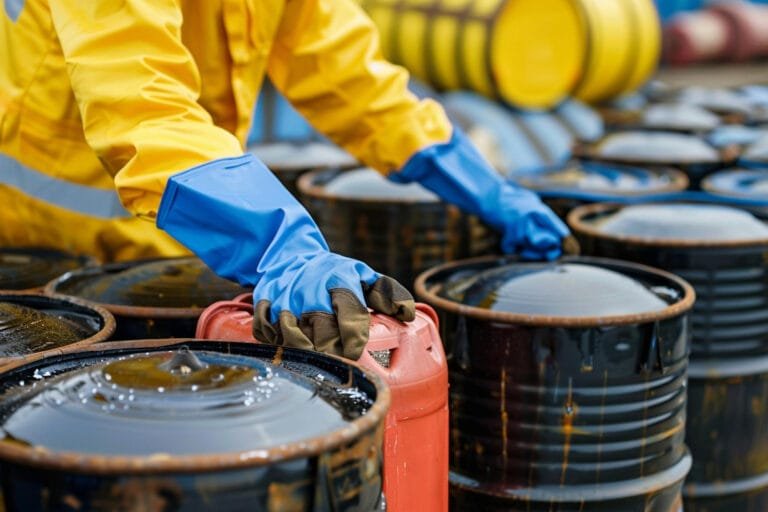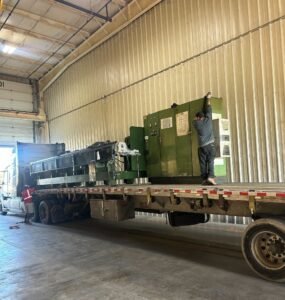The disposal of industrial fluids is a critical issue for businesses and environmentalists alike. Industrial processes generate a variety of waste fluids, from oils and solvents to cleaning agents and coolants. Improper disposal of these fluids can lead to significant environmental risks, including soil contamination, water pollution, and harm to ecosystems. In this comprehensive guide, we will explore the methods for disposing of industrial fluids responsibly, technologies available for minimizing environmental harm, and the importance of regulatory compliance.
Introduction: Understanding Industrial Fluids and Their Environmental Impact
Industrial fluids are used in various manufacturing and processing industries, ranging from automotive and aerospace to chemical plants and energy production. These fluids serve many functions such as lubrication, cooling, cleaning, and hydraulic control. Over time, they degrade or become contaminated, requiring proper disposal to avoid environmental risks.
Improper handling and disposal of these fluids can have devastating consequences for the environment. For instance, oil or solvent spills can contaminate local water sources, affect wildlife, and lead to long-term ecological damage. Therefore, industries must adopt sustainable and eco-friendly practices to dispose of their fluids while adhering to regulations.
Types of Industrial Fluids and Their Environmental Risks
Different industrial fluids pose varying levels of environmental risks. The following are some of the most common types of industrial fluids:
- Lubricating Oils: Used in machinery and equipment, these oils can contaminate soil and water sources when improperly disposed of, harming aquatic life and disrupting ecosystems.
- Solvents: Often used in cleaning and degreasing processes, solvents are highly toxic and volatile. They can easily evaporate into the atmosphere or leach into groundwater, contributing to air pollution and water contamination.
- Coolants and Antifreeze: Commonly used in heat-exchanging systems, coolants can be harmful if discharged into waterways. They contain chemicals such as ethylene glycol, which is toxic to animals and humans.
- Hydraulic Fluids: These fluids contain hazardous substances like polycyclic aromatic hydrocarbons (PAHs) and polychlorinated biphenyls (PCBs), both of which can cause significant harm to the environment.
Each of these fluids requires specific disposal methods to minimize environmental risks. Companies must develop strategies to prevent these hazardous materials from entering the natural ecosystem.
Regulatory Compliance in Industrial Fluid Disposal
Disposing of industrial fluids is regulated by national and international laws designed to protect the environment. In the United States, for example, regulations are governed by agencies such as the Environmental Protection Agency (EPA). The Resource Conservation and Recovery Act (RCRA) sets guidelines for managing hazardous wastes, including industrial fluids, ensuring proper disposal methods are employed to protect human health and the environment.
Similarly, the European Union has the Waste Framework Directive, which lays out regulations for the safe treatment and disposal of waste materials, including industrial fluids. Businesses must familiarize themselves with these regulations to avoid penalties and reduce their environmental footprint.
Common Methods for Disposing of Industrial Fluids
Several disposal methods can be used to minimize the environmental risks associated with industrial fluids. However, each method must be chosen based on the type of fluid, its level of contamination, and potential risks. Below are some of the most effective methods for industrial fluid disposal:
1. Recycling and Reuse
One of the most sustainable approaches to handling industrial fluids is recycling. Fluids like lubricants, coolants, and solvents can be filtered and purified for reuse. Recycling not only reduces the amount of waste generated but also minimizes the need for fresh resources. Companies can install in-house recycling systems to clean and reuse fluids, reducing both environmental risks and operational costs.
2. Chemical Treatment
In cases where recycling is not feasible, chemical treatment can be used to neutralize harmful substances within the fluid. This method involves adding chemical agents to the waste fluid to break down toxic components or convert them into less harmful compounds. The treated fluid can then be disposed of with minimal risk to the environment.
3. Incineration
Incineration is often used for highly toxic or non-recyclable fluids. The process involves burning the waste at high temperatures to destroy hazardous compounds. Modern incineration plants are equipped with advanced filtration systems that capture and neutralize harmful emissions, such as carbon dioxide and particulate matter, ensuring minimal environmental impact.
4. Biological Treatment
Bioremediation is an emerging method that uses microorganisms to break down harmful substances in industrial fluids. Bacteria and other microbes can metabolize pollutants, converting them into non-toxic byproducts. This method is particularly effective for fluids contaminated with organic compounds.
5. Landfilling
In some cases, industrial fluids may need to be solidified and disposed of in landfills. However, this method is the least preferable due to the risk of groundwater contamination. Fluids must be treated to meet specific regulatory standards before they are landfilled, and proper containment systems should be in place to prevent leachate from contaminating local ecosystems.
Preventing Fluid Contamination in Industrial Processes
One way to reduce the environmental risk of industrial fluid disposal is to prevent contamination from occurring in the first place. Companies can implement various strategies to extend the life of their fluids and reduce the volume of waste generated. These include:
- Regular Maintenance: Regularly maintaining equipment and machinery can help prevent leaks and spills, which reduce fluid contamination.
- Filtration Systems: Using advanced filtration systems can extend the life of industrial fluids by removing impurities that build up over time.
- Fluid Monitoring: Installing sensors to monitor the condition of industrial fluids can help companies know when it’s time to recycle or dispose of fluids before they become too contaminated.
By incorporating these preventative measures, businesses can minimize the frequency of fluid disposal and reduce their overall environmental impact.
The Role of Technology in Reducing Environmental Risk
Advances in technology have played a significant role in improving the disposal of industrial fluids and reducing their environmental impact. From cutting-edge recycling systems to sensor-driven monitoring technologies, modern innovations are helping industries become more eco-friendly and compliant with regulations.
1. Smart Sensors for Fluid Monitoring
Smart sensors can be installed in industrial systems to monitor fluid quality in real time. These sensors detect changes in fluid composition, such as contamination levels, temperature, and pH, allowing companies to take proactive measures before disposal is necessary. By continuously monitoring fluid conditions, businesses can optimize their fluid usage and minimize waste.
2. Advanced Filtration Systems
New filtration technologies have improved the ability to clean and recycle industrial fluids. For example, membrane filtration systems can remove fine particles and even some dissolved contaminants from fluids, making them suitable for reuse. These systems are particularly useful for industries that deal with large volumes of fluids, such as metalworking and chemical processing.
3. Automated Waste Management Systems
Automation has also entered the field of waste management, enabling companies to manage fluid disposal more efficiently. Automated waste management systems can track fluid usage, contamination levels, and disposal processes, ensuring compliance with environmental regulations. This level of automation reduces human error and streamlines the waste disposal process.
Reducing Environmental Risk Through Employee Training and Awareness
In addition to implementing advanced technologies and processes, companies must ensure that their employees are properly trained on fluid management and disposal techniques. Educating workers on the risks associated with industrial fluids and the proper methods for handling and disposing of them is essential to reducing environmental harm.
Companies should offer regular training programs on:
- Proper fluid handling techniques
- Spill prevention and response
- Waste fluid storage protocols
- Environmental regulations and compliance
By fostering a culture of awareness and responsibility, companies can reduce the likelihood of accidents and ensure that fluids are disposed of safely.
Partnering with Alltracon for Efficient Industrial Fluid Management
Alltracon is a leading service provider specializing in industrial fluid management and environmental protection. With expertise in fluid recycling, disposal, and waste management, Alltracon helps businesses minimize their environmental impact while maintaining operational efficiency. Their comprehensive range of services includes fluid analysis, filtration systems, regulatory compliance support, and employee training. By partnering with Alltracon, industries can ensure that their fluid disposal practices are safe, sustainable, and in full compliance with environmental regulations.
Conclusion: Toward Sustainable Fluid Management Practices
The disposal of industrial fluids is a complex yet critical issue for industries worldwide. By adopting sustainable practices, leveraging advanced technologies, and complying with regulations, companies can significantly reduce their environmental impact. From recycling and chemical treatment to incineration and bioremediation, there are several methods available for responsible fluid disposal.
As industries move toward more eco-friendly practices, it is essential to continue innovating and educating employees on the importance of fluid management. By taking a proactive approach, industries can protect the environment while maintaining efficient and compliant operations. Partnering with expert service providers like Alltracon can further enhance a company’s ability to manage fluids responsibly and sustainably, ensuring a cleaner and safer future for all.














